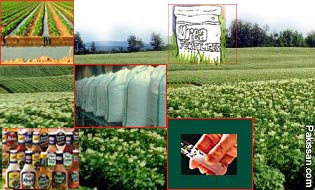Fertilizers don''t always help in revegetation efforts
 Washington, December 18 : A new research has determined that fertilizer does not always help in revegetation efforts.
Washington, December 18 : A new research has determined that fertilizer does not always help in revegetation efforts.
The research was carried out by Stephane Boudreau, a Professor of Ecology at Universite Laval, and two colleagues, who spent a summer growing three types of native plants in the northern village of Whapmagoostui in subarctic Quebec in Canada.
They found that a top dressing of organic fertilizer had virtually no impact on the plants while mineral fertilizer, the kind sold by gardening stores, showed mixed results.
Over the last 60 years, Whapmagoostui, a village of 750 mostly Cree residents, has witnessed the loss of close to 50 percent of vegetation in the village and surrounding area because of land development and ATV use.
The result is a community covered with bare sand but no vegetation.
"The vegetation cover in the village is all degraded. People want to live in a place that''s nice," said Boudreau.
In addition, the region is subject to strong winds that create sandstorms that cause some respiratory problems for the residents.
The village came to Boudreau and his colleagues for assistance with revegetation plans.
Villagers selected three plant species to use in the experiment - American dune grass, beach pea and spike trisetum.
The plants were grown outdoors and inside a greenhouse and were fed mineral fertilizer or top-dressed with organic fertilizer collected from a nearby marsh.
Each of the species responded differently to the fertilizers.
The organic material had a neutral or a negative effect.
"Some studies show that organic fertilizer can be quite important. It can increase water retention of the soil and increase nutrient levels. But this didn''t work at all. It is still a bit puzzling," said Boudreau.
Results for the mineral fertilizer were mixed.
Dune grass performed well to the addition of fertilizer, the reaction of spike trisetum was mixed, while the beach pea was impacted negatively.
"The beach pea is a legume and they tend to grow better if the substrate is poor. So if you add nutrients they don''t like it too much," said Boudreau.
Based on the results, Boudreau and his colleagues would not recommend beach pea be used in revegetation efforts in areas with similar soil.
Dune grass is a much better choice, as not only does it respond well to regrowth efforts, its roots can extent to a few meters, which helps to keep sandy substrate in place. (ANI)